
Dictyoptera is an insect superorder that includes two extant orders of polyneopterous insects: the order Blattodea and the order Mantodea (mantises). While all modern Dictyoptera have short ovipositors, the oldest fossils of Dictyoptera have long ovipositors, much like members of the Orthoptera.

Ectobiidae is a family of the order Blattodea (cockroaches). This family contains many of the smaller common household pest cockroaches, among others. They are sometimes called wood cockroaches. A few notable species include:

Corydiidae, previously known as Polyphagidae, is a family of the order Blattodea (cockroaches). Many are known as sand cockroaches. The family is divided into five subfamilies, comprising some 40 genera. One prominent species is the desert cockroach, Arenivaga investigata.
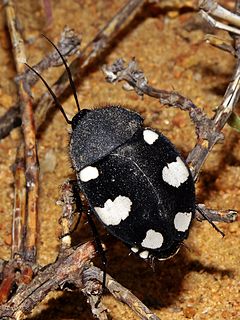
Blattodea is an order of insects that contains cockroaches and termites. Formerly, the termites were considered a separate order, Isoptera, but genetic and molecular evidence suggests termites evolved from within the cockroach lineage, cladistically making them cockroaches as well. The Blattodea and the mantises are now all considered part of the superorder Dictyoptera. Blattodea includes approximately 4,400 species of cockroach in almost 500 genera, and about 3,000 species of termite in around 300 genera.

Cockroaches are insects of the order Blattodea, which also includes termites. About 30 cockroach species out of 4,600 are associated with human habitats. Some species are well-known as pests.
Depopulation of cockroaches in post-Soviet states refers to observations that there has been a rapid disappearance of various types of cockroaches since the beginning of the 21st century in Russia and other countries of the former USSR. Various factors have been suggested as causes of the depopulation.
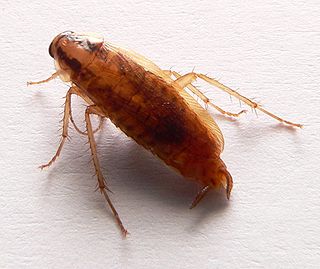
Blattellinae is a subfamily of the cockroach family Ectobiidae. It includes the global household pest Blattella germanica, the German cockroach, but also a number of species that are known to be endangered. It contains about 70 genera.
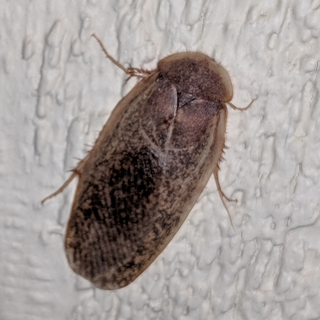
Arenivaga apacha, the Apache sand cockroach, is a species of cockroach in the family Corydiidae. It is found in North America.
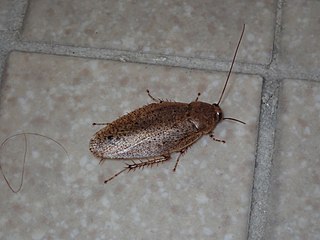
Epilampra maya, the Maya cockroach, is a species of cockroach in the family Blaberidae. It is found in Central America and North America.
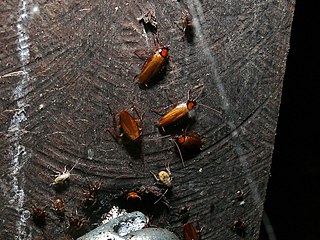
Symploce is a genus of cockroach in the family Ectobiidae.

Acroneuria is a genus of common stoneflies in the family Perlidae. There are more than 30 described species in Acroneuria.

Neostylopyga rhombifolia, the harlequin roach, is a species of cockroach in the family Blattidae. It is found in North America, Oceania, and Southern Asia.
Arenivaga erratica, the erratic sand cockroach, is a species of cockroach in the family Corydiidae. It is found in Central America and North America.

Eremoblatta subdiaphana, the hairy desert cockroach, is a species of cockroach in the family Corydiidae. It is found in North America.

Ectobius sylvestris, known generally as the forest cockroach or lesser cockroach, is a species of cockroach in the family Ectobiidae. It is found in Europe and Northern Asia, North America, and temperate Asia.
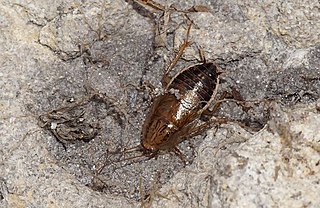
Cariblatta minima, the least yellow cockroach, is a species of cockroach in the family Ectobiidae. It is found in North America and the Caribbean.

Pseudomops is a genus of cockroach in the family Ectobiidae. There are more than 40 described species in Pseudomops.

Latiblattella rehni, or Rehn's cockroach, is a species of cockroach in the family Ectobiidae. It is found in North America and the Caribbean.
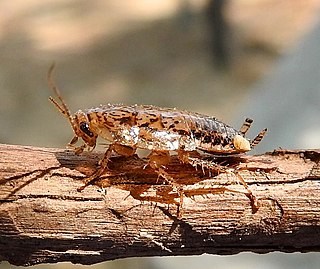
Latiblattella is a genus of cockroach in the family Ectobiidae.
Aglaothorax morsei, or Morse's shieldback, is a species of shield-backed katydid in the family Tettigoniidae. It is found in North America.

















